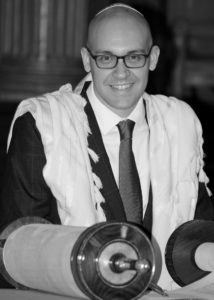When the criminal justice system works well, it should function much like an extended Yom Kippur. Someone has erred and though restorative justice, they have done teshuvah, changing patterns in their life that led them to sin or break a law in the first place and setting them out on a renewed path toward righteousness and goodness.
Much of the reason that teshuvah works is because we trust another in their process. We know they have done the hard work to change and we stop relating to them through the lens of their past. Sadly, the criminal justice system does not work like this.
Sign up to receive Torah from T’ruah in your inbox each week.
As a rabbi in New Jersey, I’m very aware that my state functions much like others. Despite leaving prison and despite being told that they may return to society, many formerly incarcerated people face challenges that give them the message that they have no true avenues toward change, and that despite their best efforts at teshuvah, they will never achieve a clean slate.
Here in my state, formerly incarcerated people can vote; however, those on probation and parole are denied that basic right. Where we are is better than some states, twelve of which require citizens to ask for special permission from the governor before they can be allowed to enter the ballot box even after they are fully released from the system. In some states it is legal for private housing complexes to deny entry on the basis of a criminal record. There is even a federal law on the books, the 1996 Federal Welfare Law, which prohibits individuals with a drug felony on their record from receiving food stamps. To date only a minority of states have passed legislation to remedy the federal mandate.
Just as we want to think that our processes of teshuvah over the High Holy Days should give us a fresh start, so too should we consider the costs of denying this opportunity to our formerly incarcerated neighbors.
Our ancient rabbis understood that when the Torah tells us not to “wrong another” (Leviticus 25:17) it was actually talking about certain verbal attacks that cut to the core of a person’s wellbeing. One of those offences is telling someone who once sinned that they will never have a path toward redemption and acceptance. They remind us, “If one is a penitent, another may not say to him: Remember your earlier deeds.” (Talmud, Bava Metzia 58b).
For this reason, Maimonidies wrote in the 12th century:
It is absolutely sinful to remind a baal teshuvah [penitent person] of his former deeds or to recount them in his presence in order to embarrass him. It is even prohibited to discuss the situation vaguely in order to cause him to recall his sins. (Hilchot Teshuvah 7:8).
For our ancestors, much of the reason we should avoid telling someone who has been penitent about their former life is because we don’t want to shame them, since shaming another is likened to spilling their blood (Talmud, Bava Metzia 58b). For this reason we, as a society, need to create parapets around potential words and actions to ensure this does not happen.
Find more commentaries for Yom Kippur
Our rabbis understood that the risks of not accepting someone’s repentance were dire. In the Talmud, Rabbi Yochanan chastises his study partner Reish Lakish over his previous life as a bandit chief before his conversion to Judaism and the latter dies of a broken heart (Bava Metzia 84a).
We live in a society today that does not take the notion that we can work toward a clean slate seriously enough. Shamefully, it is our justice system that sends a clear message to those seeking repentence and reintegration that change is impossible. To combat this, we need to keep reminding our legislators about Judaism’s central message at this time of year: we cannot be defined by what we did. Rather we should be known by who we are. Change is meritorious. In fact, if someone truly repents, their former deeds can even become merits (Talmud, Yoma 86b).
 We owe it to those who have sought out the pathway to change to see them through to the end. Much of the liturgy of the High Holy Days reminds us of our communal responsibility to facilitate change for members of our community. Shouldn’t the least of these actions be removing the barriers that stand in the way of affirming that change is possible?
We owe it to those who have sought out the pathway to change to see them through to the end. Much of the liturgy of the High Holy Days reminds us of our communal responsibility to facilitate change for members of our community. Shouldn’t the least of these actions be removing the barriers that stand in the way of affirming that change is possible?
Rabbi Marc Katz is the Rabbi at Temple Ner Tamid in Bloomfield, NJ. He is the author of “The Heart of Loneliness: How Jewish Tradition Can Help You Cope and Find Comfort” (Jewish Lights) which was a finalist for the National Jewish Book Award.

